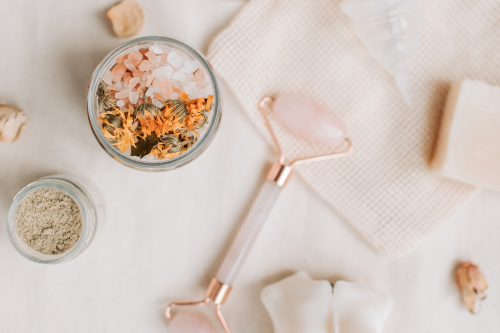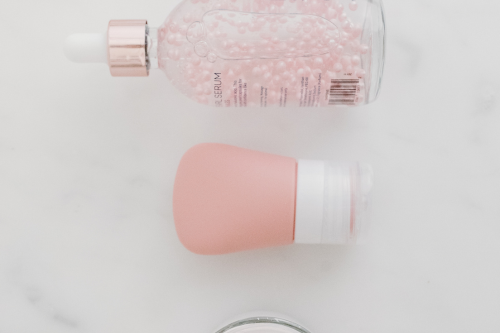


In a world where hustle culture reigns supreme, taking time to care for yourself can feel like a radical act. The constant pressure to be productive, available, and perfect in every area of life leaves little room for rest, let alone self-care. But what if we flipped the script? What if we treated self-care not as an occasional indulgence, but as a necessary part of our weekly routine? That’s where the idea of a Self-Care Sunday comes in.
A dedicated day to slow down, reconnect with yourself, and tend to your mental, emotional, and physical well-being. As a holistic anxiety therapist, I’ve seen firsthand how transformative it can be to carve out time for self-care. Not only does it provide a much-needed break from the chaos of daily life, but it also offers an opportunity to practice mindfulness, nourish your body, and soothe your anxious mind, which I think we all could benefit from.
But let’s be real—self-care isn’t always as easy as it sounds. Between work, family, and social obligations, it can be hard to justify spending a whole day on yourself. And even when you do find the time, knowing what to do with it can be overwhelming. That’s where this holistic approach comes in. By focusing on the mind-body connection and embracing self-care as a holistic practice, you can create a Self-Care Sunday routine that truly replenishes you, inside and out.
In this blog post, we’ll dive deep into what it means to embrace Self-Care Sunday from a holistic perspective. We’ll explore how anxiety impacts your ability to care for yourself, discuss ways to overcome common barriers to self-care, and offer practical tips for creating a self-care routine that works for you. Whether you’re new to the concept or looking to deepen your practice, this post will help you reclaim your peace, one Sunday at a time.

Before we dive into the specifics of Self-Care Sunday, it’s important to understand the relationship between self-care and anxiety. In today’s fast-paced world, anxiety is more common than ever. Whether it’s the pressure to succeed, the constant bombardment of information, or the ever-present fear of missing out, there are countless triggers that can contribute to feelings of anxiety.
Anxiety often manifests in ways that we don’t immediately recognize. It can show up as chronic stress, physical tension, irritability, or even a constant sense of overwhelm. For many, these feelings become so ingrained in daily life that they start to feel normal. But the truth is, living in a state of constant anxiety is anything but normal, and it can take a serious toll on your mental and physical health.
This is where self-care comes in. Self-care isn’t just about pampering yourself—it’s about taking intentional actions to support your overall well-being. When practiced regularly, self-care can help to alleviate anxiety by giving you the space to relax, recharge, and reconnect with yourself. It allows you to step away from the noise and chaos of everyday life and focus on what you need to feel balanced and centered.
From a holistic perspective, self-care is about nurturing the mind, body, and spirit. It’s not just about addressing the symptoms of anxiety, but also about getting to the root of the issue and creating a lifestyle that supports your overall well-being. By dedicating time each week to holistic self-care practices, you can reduce your anxiety, improve your mood, and enhance your overall quality of life.

So, what does a holistic Self-Care Sunday look like? The beauty of self-care is that it’s entirely personal—what works for one person may not work for another. The key is to create a routine that feels nourishing and supportive for you. Here are some tips to help you craft your ideal Self-Care Sunday: Consider incorporating various self care ideas to promote mental wellness, reduce stress, and enhance overall well-being.
The first step in creating a successful Self-Care Sunday is to identify your unique needs. What are the areas of your life that feel most depleted? Where do you need the most support in balancing your personal and professional life? For some, physical self-care might be a top priority—this could include activities like yoga, stretching, or a soothing bath. For others, emotional self-care might take precedence—this could involve journaling, therapy, or spending time with loved ones.
Take some time to reflect on what you need most in your life right now. Once you have a clear understanding of your needs, you can start to build a self-care routine that addresses those areas.
A holistic approach to self-care involves nurturing all aspects of your being—mind, body, and spirit, thereby promoting physical and mental health. This means that your Self-Care Sunday should include activities that support each of these areas.
For the mind, consider practices that help you to relax and clear your thoughts. This could include meditation, deep breathing exercises, or reading a book that inspires you. The goal is to create a sense of mental calm and clarity.
For the body, focus on activities that help you to feel physically rejuvenated. This could include gentle exercise, such as yoga or walking, nourishing your body with healthy foods, or simply getting enough rest. The key is to listen to your body and give it what it needs to feel strong and energized.
For the spirit, engage in practices that help you to feel connected to something greater than yourself. This could include spending time in nature, practicing gratitude, or engaging in a creative activity that brings you joy. The idea is to nurture your inner self and cultivate a sense of peace and fulfillment.
By incorporating activities that support the mind, body, and spirit, you can create a Self-Care Sunday routine that leaves you feeling balanced and whole.
If you’re not sure where to start with your Self-Care Sunday routine, here are some examples of activities that support holistic self-care:
The key is to choose activities that resonate with you and that you genuinely enjoy. Self-care should never feel like a chore—it should be something that you look forward to and that brings you a sense of peace and joy.

Even with the best intentions, practicing self-care can sometimes feel challenging. There are often barriers that get in the way, whether it’s time constraints, feelings of guilt, or simply not knowing where to start. Here are some common barriers to self-care and how to overcome them:
One of the most common barriers to self-care is guilt. Many people, especially women, feel guilty about taking time for themselves. They may worry that they’re being selfish or that they’re not doing enough for others. This guilt can be particularly strong for those who struggle with perfectionism—they may feel like they have to do everything perfectly, and that taking time for self-care is a sign of weakness.
The first step in overcoming this guilt is to reframe your thinking. Self-care is not selfish—it’s necessary. Just as you wouldn’t expect your car to run without gas, you can’t expect yourself to function at your best without taking time to refuel. Self-care allows you to show up as your best self for the people you care about. It’s an act of love, not only for yourself but for those around you.
If you struggle with perfectionism, try to let go of the “all or nothing” mentality. Self-care doesn’t have to be perfect or elaborate to be effective. Even small acts of self-care can make a big difference in your overall well-being. Remember that it’s okay to start small and build from there.
Another common barrier to self-care is time. In our busy lives, it can be hard to find the time to dedicate to self-care, especially if you have a demanding job, family responsibilities, or other commitments.
One way to overcome this barrier is to schedule your Self-Care Sunday in advance. Treat it like an important appointment that you can’t miss. Block off time in your calendar and stick to it. If a whole day feels overwhelming, start with just an hour or two and build from there.
It’s also important to manage your energy effectively. If you’re feeling exhausted, it’s okay to opt for more restful activities. The key is to listen to your body and honor what it needs. Sometimes self-care looks like a bubble bath, and sometimes it looks like taking a nap. Both are valid and important.
One of the biggest challenges to self-care is the “all or nothing” mentality. This is the belief that if you can’t do something perfectly, it’s not worth doing at all. This mindset can be especially harmful when it comes to self-care because it can prevent you from taking even small steps to care for yourself.
To overcome this barrier, try to shift your perspective. Self-care is not about perfection—it’s about progress. Even small acts of self-care can have a positive impact on your well-being. Whether it’s five minutes of deep breathing, a quick walk around the block, or simply taking a moment to pause and reflect, every little bit counts.
Remember that self-care is a practice, not a one-time event. It’s something that you can build on over time. The more you practice, the easier it will become, and the more benefits you’ll experience.
One of the most powerful aspects of a Sunday self care routine is the opportunity to create rituals that bring you a sense of peace and consistency. Rituals are more than just habits—they’re intentional practices that hold special meaning for you. They can help to ground you, create a sense of structure, and provide a comforting routine in your life.
Creating rituals doesn’t have to be complicated or time-consuming. In fact, the best rituals are often the simplest. Here are some ideas for self-care rituals that you can incorporate into your Self-Care Sunday: self care Sunday ideas can include activities like taking a bubble bath, journaling, and creating a spa day at home.
The key to creating meaningful rituals is to choose practices that resonate with you and that you can realistically incorporate into your routine. Start with one or two rituals and build from there.
Your environment plays a big role in your ability to relax and practice self-care. On Self-Care Sunday, take the time to create a soothing environment at home. This could involve decluttering your space, lighting candles, playing calming music, or diffusing essential oils.
Consider what makes you feel most at ease and try to incorporate those elements into your environment. If you love being in nature, bring some plants into your space. If you find comfort in cozy textures, add some soft blankets or pillows to your living area. The goal is to create a space that feels like a sanctuary where you can fully unwind and recharge.
Routine is a powerful tool for maintaining mental wellness, especially for those who struggle with anxiety. A consistent routine provides structure, predictability, and a sense of control, all of which can help to reduce feelings of anxiety.
On Self-Care Sunday, try to establish a routine that you can look forward to each week. This doesn’t mean that every Sunday has to look exactly the same, but having a general structure can help you to feel more grounded and centered.
For example, you might start your day with a morning meditation, followed by a nature walk, some creative time, and a soothing bath in the evening. The specifics of your routine can vary, but having a general plan can help you to stay on track and make the most of your self-care day.

While Self-Care Sunday is a great way to prioritize your well-being, the benefits of self-care can extend beyond just one day. By integrating self-care practices into your everyday life, you can create a lifestyle that supports your mental, emotional, and physical health.
The goal of Self-Care Sunday is to set the tone for the rest of the week. By taking the time to nurture yourself on Sunday, you can start the week feeling refreshed, centered, and ready to take on whatever comes your way.
To extend the benefits of Self-Care Sunday throughout the week, consider incorporating small self-care practices into your daily routine. This could involve taking a few minutes each morning to meditate, setting aside time in the evening to relax, or simply being mindful of your needs throughout the day.
Remember that self-care doesn’t have to be time-consuming or elaborate. Even small acts of self-care, such as taking a deep breath, enjoying a healthy snack, or stepping outside for some fresh air, can make a big difference in your overall well-being.
Here are some small daily practices that you can incorporate into your routine to support your overall well-being:
These small practices can be easily integrated into your daily routine and can have a big impact on your overall well-being.
Finally, it’s important to practice self-compassion in your daily routine. Self-compassion involves treating yourself with kindness, understanding, and acceptance, especially during times of difficulty.
When you practice self-compassion, you acknowledge that it’s okay to have off days, to make mistakes, and to not be perfect. Instead of being hard on yourself, you approach yourself with the same kindness and understanding that you would offer to a friend.
Self-compassion is especially important when it comes to self-care. It’s easy to fall into the trap of thinking that you’re not doing enough or that you’re not doing self-care “right.” But the truth is, there’s no right or wrong way to practice self-care. The most important thing is that you’re making an effort to care for yourself, in whatever way works for you.
On Self-Care Sunday and throughout the week, make self-compassion a priority. Be gentle with yourself, celebrate your efforts, and remember that self-care is a journey, not a destination.

Ready to make self-care a non-negotiable in your life? Start your own Self-Care Sunday tradition this week! Whether it’s a soothing bath, journaling your thoughts, or savoring a quiet cup of tea, commit to just one hour to nurture your mind, body, and spirit. You deserve it. Share your plans or favorite self-care rituals in the comments below—I’d love to cheer you on!


Holistic Therapist, Nutritional Therapy Practitioner and Yoga Instructor in Elk Grove, California.
© Copyright 2024 That’s so well. All Rights Reserved. LICENSED MARRIAGE AND FAMILY THERAPIST #107356. DISCLAIMER. PRIVACY PRACTICES. TERMS AND CONDITIONS. Website by Chloe Creative. 9727 Elk Grove Florin Road, Elk Grove Ca 95624